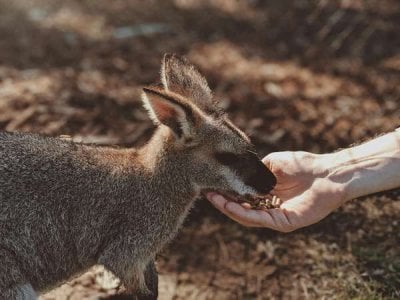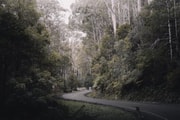Stop Feeding Kangaroos or Face the Consequences - Shocking Rescues Reveal the Dangers!
By
Danielle F.
- Replies 4
As Australians, we share our beautiful country with an array of unique and fascinating wildlife. The iconic kangaroo is one such creature that often captures the hearts of both locals and tourists alike. However, recent incidents in Victoria's Grampians region have prompted a serious warning from authorities: stop feeding the kangaroos, or face the consequences.
Wildlife rescuers have reported multiple cases of kangaroos getting their heads stuck in domestic kitchen bins, a distressing outcome for the animals and a concerning trend for those who care for our native species. The desire for an up-close and personal experience with wildlife has led to some dangerous situations, with tourists inadvertently encouraging kangaroos to seek out human food sources.
Pam Turner from Wildwood Wildlife Shelter recounted a recent incident where a kangaroo, lured by the scent of leftovers, attempted a 'bin dive' and ended up with its head trapped in a bin lid. This isn't an isolated event; similar occurrences have been noted around the Grampians town of Halls Gap, where kangaroos have been seen rummaging through bins in search of food.
The root of the problem seems to be tourists feeding kangaroos inappropriate food, such as bread or sandwiches, to coax them closer for a memorable encounter. While the intention may be harmless, the repercussions are anything but. Not only does this lead to kangaroos associating humans with food, but it also encourages them to forage in places they shouldn't, like kitchen bins, which are not designed with wildlife in mind.
Katherine Whittaker from the state's environment department outlined the myriad reasons why feeding wildlife is discouraged. The consequences range from injury and death to poor nutrition, exposure to disease, and behavioural changes that can disrupt the natural balance of the ecosystem. Additionally, food left out for wildlife can attract pests like rats and foxes, further complicating the issue.
It's not just the physical dangers that should deter people from feeding kangaroos; there's also the potential for aggressive behaviour. While kangaroos may seem docile, they can become unpredictable when fed by humans, posing a risk to both the animals and the public.
To combat this growing problem, wildlife rescuers and the Victorian environment department are campaigning to educate tourists and locals about the dangers of feeding wildlife. Signs are posted in tourist spots around the Grampians National Park, and a 'living with wildlife' flyer has been distributed to local councils and Parks Victoria. These efforts aim to raise awareness and encourage responsible interaction with our native animals.
Despite the presence of laws against feeding native animals, enforcement can be challenging. As such, community education is seen as a more effective approach. Land managers and local authorities are urged to use signage and social media to spread the message and protect our wildlife.
As members of the Seniors Discount Club, we have a responsibility to lead by example and share this knowledge with our families and friends. Remember, the best way to enjoy Australia's wildlife is to observe them in their natural habitat, without interference. Let's all do our part to ensure that our kangaroos, and all native animals, can live safely and freely in the wild.

We invite you to share your thoughts and experiences on this topic in the comments below. Have you witnessed the consequences of feeding wildlife? What steps do you think could be taken to further educate the public on this issue? Your insights are valuable, and together, we can help make a difference.
Wildlife rescuers have reported multiple cases of kangaroos getting their heads stuck in domestic kitchen bins, a distressing outcome for the animals and a concerning trend for those who care for our native species. The desire for an up-close and personal experience with wildlife has led to some dangerous situations, with tourists inadvertently encouraging kangaroos to seek out human food sources.
Pam Turner from Wildwood Wildlife Shelter recounted a recent incident where a kangaroo, lured by the scent of leftovers, attempted a 'bin dive' and ended up with its head trapped in a bin lid. This isn't an isolated event; similar occurrences have been noted around the Grampians town of Halls Gap, where kangaroos have been seen rummaging through bins in search of food.
The root of the problem seems to be tourists feeding kangaroos inappropriate food, such as bread or sandwiches, to coax them closer for a memorable encounter. While the intention may be harmless, the repercussions are anything but. Not only does this lead to kangaroos associating humans with food, but it also encourages them to forage in places they shouldn't, like kitchen bins, which are not designed with wildlife in mind.
Katherine Whittaker from the state's environment department outlined the myriad reasons why feeding wildlife is discouraged. The consequences range from injury and death to poor nutrition, exposure to disease, and behavioural changes that can disrupt the natural balance of the ecosystem. Additionally, food left out for wildlife can attract pests like rats and foxes, further complicating the issue.
It's not just the physical dangers that should deter people from feeding kangaroos; there's also the potential for aggressive behaviour. While kangaroos may seem docile, they can become unpredictable when fed by humans, posing a risk to both the animals and the public.
To combat this growing problem, wildlife rescuers and the Victorian environment department are campaigning to educate tourists and locals about the dangers of feeding wildlife. Signs are posted in tourist spots around the Grampians National Park, and a 'living with wildlife' flyer has been distributed to local councils and Parks Victoria. These efforts aim to raise awareness and encourage responsible interaction with our native animals.
Despite the presence of laws against feeding native animals, enforcement can be challenging. As such, community education is seen as a more effective approach. Land managers and local authorities are urged to use signage and social media to spread the message and protect our wildlife.
As members of the Seniors Discount Club, we have a responsibility to lead by example and share this knowledge with our families and friends. Remember, the best way to enjoy Australia's wildlife is to observe them in their natural habitat, without interference. Let's all do our part to ensure that our kangaroos, and all native animals, can live safely and freely in the wild.
Key Takeaways
- Wildlife rescuers in the Grampians have reported kangaroos getting their heads stuck in kitchen bins due to inappropriate feeding by tourists.
- Authorities are campaigning to educate the public on the dangers of feeding wildlife and the disruption it causes to their natural behaviour.
- Laws against feeding native animals exist but are difficult to enforce, with penalties in place for non-compliance.
- The Victorian environment department urges tourists and locals to follow guidelines and use available educational resources to avoid unintentional harm to wildlife.








